There Are No Easy Answers: Native People and Syrian Refugees

“They made us many promises, more than I can remember, but they kept one; they promised to take our land, and they did." - Ma'píya Lúta (aka Red Cloud) Oglala Lakota
“If aliens ever visit us, I think the outcome would be much as when Christopher Columbus first landed in America, which didn’t turn out very well for the Native Americans.” - Stephen Hawking, White Guy
There are no easy answers.
The recent Syrian refugee debate has brought an endless amount of bumper-sticker politics on both sides of the debate. Those bumper-sticker positions vastly oversimplify the discussion. On one hand are the hateful Donald Trumps and Ben Carsons and their xenophobic ilk who say that we should not allow anyone in. Period. Obviously this position really has no principles other than:
1) It’s election season and they are both seeking to prove their shaky conservative credentials (Carson is an actual conservative but being a black makes him inherently suspect as a conservative), and 2) these particular refugees are not candidates to marry Donald Trump (because everyone knows that those are the only immigrants he likes).
On the other hand, there are those who point out that it was refugees who founded this nation, as we currently know it. Indeed, as they say, were it not for those European refugees—who looked to escape religious persecution, who knew that they would never, ever own land, and who were running from the freakin’ bubonic plague—there would be no “America” today.
Parts of that argument are true, but to reduce all of Native peoples’ immigration policies to be of “acceptance” and “openness” is both dishonest and even insulting toward our ancestors.
As a matter of historical record, different Native groups adapted their positions and policies based upon changing circumstances and relationships with the European immigrants. Those groups who got wind of bad interactions with the Europeans weren’t nearly as inviting as some other groups who weren’t aware of the Europeans’ destructive habits, or who knew but took a risk to trust anyway.
It’s also worth noting that within each and every tribal nation, the matter of how to appropriately deal with invaders was always up for debate and hotly contested, as tribes were then, as they are now, comprised of a myriad of individual opinions and political factions. Therefore, although there is some poignancy to the rhetoric, the argument is really only a funny punch line with no substantive relevance.
It’s a reductive take on a nuanced and complex history of interaction that spanned the course of several hundred years as Europeans slowly made their way across this continent and each Native group handled them differently.

Bumper sticker (and now meme) politics suck. They’re stupid, don’t require any meaningful thought, and only serve as red meat for those who have already made up their minds.
On both sides.
As Maȟpíya Lúta stated in the above quote, our ancestors were profoundly aware of what was going on around them. Or as the great Sauk leader Ma-ka-tai-me-she-kia-kiak (or “Black Hawk”) said, he “fought for his countrymen, the squaws and papooses, against white men, who came, year after year, to cheat them and take away their lands.” He did not have an open-door policy. Lots of Native communities did not have an open door policy. Those nations were informed by the circumstances around them and based upon that they made informed decisions.
Which brings us to Syria.
I don’t know the solution to the current refugee crisis. What I do know is that the topic deserves more thought than is found in any of the memes on the topic. I also know that the subject is infinitely more complicated than the assumption that Native people had an open-door immigration policy that didn’t question the intentions of the immigrants. No. Blackfeet people chased Lewis and Clark from their territory specifically because the Natives paid attention to the circumstances around them. They quickly learned that these white folks were a threat, and changed their policy of international relations accordingly.
Native people were not oblivious to current events or entirely unthreatened by the arrival of white people. It’s silly to think that we were.
The Syrian refugees are caught in a set of current events that, in my estimation, causes reasonable concern for some Americans regarding their family’s safety. The fact that there are also domestic concerns that Americans should likewise pay attention to doesn’t deter or add to those reasonable concerns that those Americans might have about conflict in the middle east. A person can be concerned about both.
History should tell Native people that we absolutely should be concerned about both. The behavior of those first refugees probably means that Native people should be more concerned about any subsequent refugees, not less concerned. Then again, that those refugees are fleeing violence brought on by invaders of their own might mean that native people have more in common with them than the average American. That doesn’t mean that Native people should advocate for accepting refugees or not accepting refugees—it simply means that the analysis is far from simple.
And it means that folks should stop using Native people as mascots for those meaningless memes to prove completely irrelevant points.

Gyasi Ross, Editor at Large
Blackfeet Nation/Suquamish Territories
AUTHOR: PROJECT "ISSKOOTSIK" (BEFORE HERE WAS HERE)
AUDIOBOOK AVAILABLE NOW at
shop.krecs.com
Twitter:
@BigIndianGyasi
© 1998 - 2015 Indian Country Today. All Rights Reserved To subscribe or visit go to: http://www.indiancountry.com Read more at http://indiancountrytodaymedianetwork.com/2015/11/30/there-are-no-easy-answers-native-people-and-syrian-refugees-162601